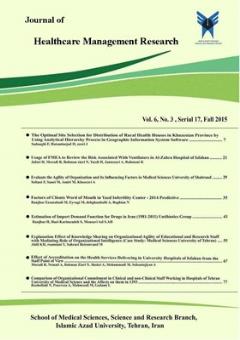Abstract The effect of perceived organizational policies on the job performance of the employees of the deputy health department of Qom
Subject Areas : Health Management Services
Abolfazl Mohammadkarimi
1
,
کامران حاجی نبی
2
*
![]() ,
leila nazarimanesh
3
,
leila nazarimanesh
3
1 - M.A. Department of Health and Medical Services Management, Faculty of Medical Sciences and Technologies, Science and Research Unit, Islamic Azad University, Tehran, Iran
2 - Assistant Professor, Department of Health and Medical Services Management, Faculty of Medical Sciences and Technologies, Science and Research Unit, Islamic Azad University, Tehran, Iran
3 - Assistant Professor, Department of Health and Medical Services Management, Faculty of Medical Sciences and Technologies, Science and Research Unit, Islamic Azad University, Tehran, Iran
Keywords: perceived organizational policies, job performance, organizations, Qom province,
Abstract :
Introduction: Human power is the most valuable capital of any organization and improving its productivity is considered the main source of organizational growth and development. For this reason, today organizations are trying to focus on the identification of factors affecting the productivity of human resources according to the findings of behavioral management and resource development management. Therefore, for their survival and dynamism, organizations have to identify environmental changes and factors affecting organizations and try to reduce or intensify them. The purpose of this content is to investigate the effects of perceived organizational policies on the job performance of the employees of the health department of Qom province.
Methods: The current research is applied in terms of purpose and descriptive data collection is of correlational type. In this research, non-probability sampling method was used. Considering that the number of the target population is 1200, the statistical sample size was 291 using Cochran's equation and Morgan's table. In order to analyze the data, SPSS software version 26 and STATA software version 17 were used.
Results: In the following, in order to investigate the main hypotheses, from the non-parametric regression method, the effect of the dimension of public political behavior and the dimension of pay and promotion policies on job performance was statistically significant (significance level 0.047 and regression coefficient -0.076) and therefore Their hypotheses are accepted. Therefore, in general, it can be claimed that perceived organizational policies have an effect on job performance.
Conclusion: According to the results of the present research, organizational policies have an effect on the job performance of employees, and managers should be diligent in creating a less political environment and creating a supportive and friendly atmosphere to deal with the negative effects of politics in organizations.
1- Kobriya sh. Bahar K. Nosrati L. Examining job security and perception of organizational support in predicting the productivity of contractual employees of Khorram Abad University of Medical Sciences. Health and treatment management, 2016; 8(4): 82-92.
2- Kiani & Radfer. Identifying and ranking the factors affecting the organization's productivity using the Dimatel model. Productivity Management, 2015; 9(4(35) Winter): 111-130.
3- Noe, R.A, Hollenbeck, J. R, Gerhurt, B & Wright, P.M. Human Resource Management: gaining Competitive advantage. New York: Mc GrawHill; 2008.
4- Sheikhinejad F. Fanny A. The knowledge of Fred H. Hassanzadeh A. Examining the predictors of perception of organizational policy. Public administration perspective [Internet], 2015; (25): 45-66
5- Hassan, H., Vina, T. M. H., & I thnin, N. S. Perceived organizational politics and job satisfaction: the role of personality as moderator. LogForum, 2017; 13(4): 479-493.
6- Abbas, M., & Raja, U. Impact of perceived organizational politics on supervisory-rated innovative performance and job stress: Evidence from Pakistan. Journal of advanced management science, 2014; 2(2).
7- Khan, A. Perceptions of organizational politics, knowledge hiding, and employee creativity: The moderating role of professional commitment, Personality and Individual Difference; 2019.
8- Rasekh, N., Khan Moradi, S., & Zardoshtian, S. Impact of Perceived Organizational Policies and Perceived Organizational Support on Causing Deviant Behavior in Sport Organizations in the West of Iran. Strategic Studies on Youth and Sports, 2019; 18(43): 265-288.
9- Nešić, A., & Lalić, D. The impact of trust on job performance in organisations. Management: Journal of Sustainable Business and Management Solutions in Emerging Economies, 2017; 21(81): 27-34.
10- Haroon, A., Hussain, Y., & Nawaz, M. M. The influence of perceived organizational politics on employee performance: a case study of Lahore, Pakistan. American Journal of Social Science Research, 2017; 3(3): 7-11.
11- Zaree M. Jandaghi G. Torre N. Knowing the factors of organizational citizenship behavior and examining its relationship with organizational performance. "Organizational Culture Management" scientific journal, 2015; 4(2).
12- Kacmar, K.M., & Carlson, D.S. Job Satisfaction in a Norwigian Population of Nurses. International Journal of Nursing Studies, 1997; 44: 747-757.
13- Koopmans, L. Bernaards, C.M. Hildebrandt, V.H. Buuren, S. van, Beek, A.J. van der, Vet, H.C.W. de. Improving the Individual Work Performance Questionnaire using Rasch analysis. Journal of Applied Measurement, 2014; 15(2): 160-175.
14- Mintzberg, H. Power in and Around Organizations. Englewood Cliffs, NJ: Prentice-Hall; 1983.
15- Abbas, M., & Raja, U. Impact of perceived organizational politics on supervisory-rated innovative performance and job stress: Evidence from Pakistan. Journal of advanced management science, 2014; 2(2).
16- Bodla, M. A., & Danish, R. Q. Politics and workplace: an empirical examination of the relationship between perceived organizational politics and work performance. South Asian Journal of Management, 2009; 16(1): 44-62.

